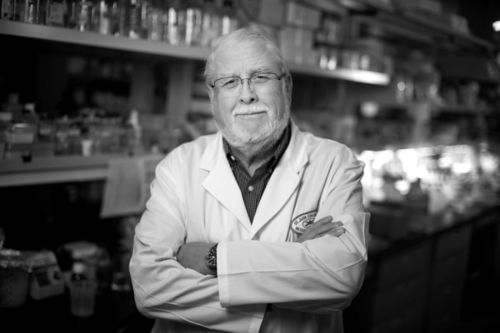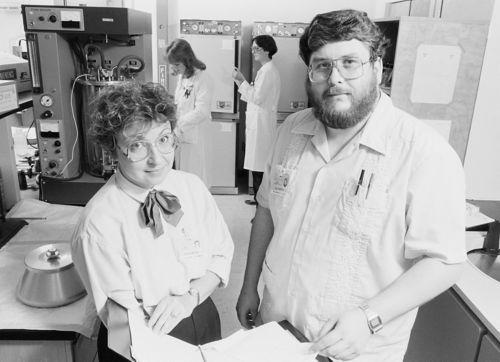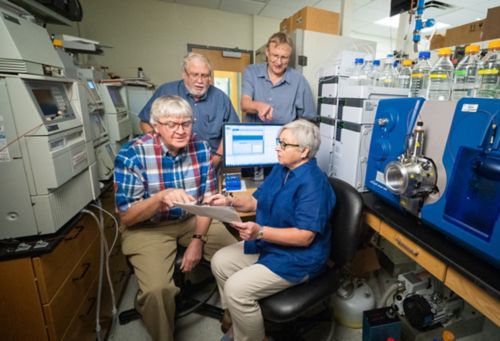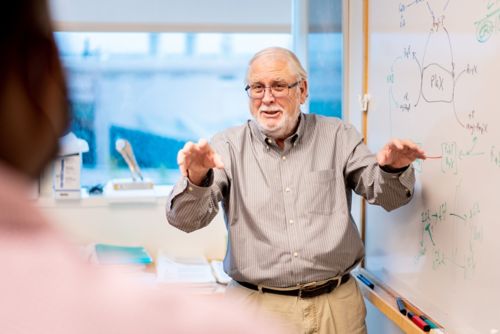St. Jude Family of Websites
Explore our cutting edge research, world-class patient care, career opportunities and more.
St. Jude Children's Research Hospital Home

- Fundraising
St. Jude Family of Websites
Explore our cutting edge research, world-class patient care, career opportunities and more.
St. Jude Children's Research Hospital Home

- Fundraising
A Rock-Solid Legacy: Honoring the Life of Charles O. Rock, PhD

Charles O. Rock, PhD, passed away on September 22, 2023. He was a member of the Department of Host-Microbe Interactions and dedicated his life’s work to the mission of St. Jude Children’s Research Hospital for 43 years.
Giant. Superstar. Pioneer. These are all words I have heard used to describe Chuck Rock. Those who knew his work may typecast him as a canonical scientist: keynote speaker, lipid aficionado and prolific publisher of high-quality manuscripts.
Those of us who knew him personally also recall another version of Rock: the quiet, confident soul who, for years, casually walked the halls of the eighth floor of Pinkel Research Tower each morning — tan briefcase in one hand and, quite often, a case of Tab soda in the other.
You were just as likely to hear him critique the latest Grizzlies basketball game as you were to hear him critique your latest experimental results.
At first glance, you’d never know that he was one of the utmost authorities on lipid metabolism. Or that he was instrumental in the growth and development of this institution.
At least, I didn’t know this when we met, but I soon found out.
I met Rock in 2017 while in graduate school. He was an invited speaker at the University of Tennessee in Knoxville. Admittedly, I was initially lured to his talk by the department’s promise of free cookies, but I stayed because of him — the “lipid guy.” His passion for research was palpable, drawing the audience in with his insightful wisdom and quirky presentation style.
I was one of the last of the 26 postdocs mentored by Rock at St. Jude, and I am a better scientist for it. But to truly understand his impact in its entirety, we must go back to the beginning.
Training and arrival at St. Jude
Rock received his PhD in lipid biochemistry from the University of Tennessee at the Biology Division, Oak Ridge National Laboratory, in 1976. He completed postdoctoral fellowships at Yale University and the University of Illinois Urbana-Champaign.
In January of 1980, Rock began his lifelong career, spanning 43 years, at St. Jude Children’s Research Hospital. He joined St. Jude as a classic biochemist with an impressive publication record and multiple grants. As a new faculty member, he continued his deep dive into fatty acid biosynthesis.

Suzanne Jackowski, PhD, and Charles O. Rock, PhD, Department of Biochemistry, shown in 1985, working toward the future.
It was sometime in the 1980s when his work caught a reporter’s attention, and he was interviewed in his laboratory to discuss his findings. Much different from the spacious, state-of-the-art laboratory in which the Rock lab would eventually end up, his laboratory space at the time left much to be desired.
Windowless and located in the basement, the reporter snidely commented on Rock’s accommodations. In true Chuck Rock fashion, he retorted, “We like to think of this as the foundation of the institution.”
In many ways, it was. This was the first of many spaces the Rock lab would occupy over the next 43 years as he chipped away at complex scientific questions that changed how we think about fatty acid synthesis, metabolism and how hosts interact with pathogens.
For the love of lipids
Rock’s first love was lipids. Two of his most notable achievements are the co-discovery of FabH, an enzyme catalyzing the first condensation reaction in bacterial fatty acid synthesis, which was published in 1992 in the Journal of Biological Chemistry, and the discovery of acyl-phosphates as intermediates in lipid metabolism, published in 2006 in Molecular Cell.
For decades, Rock systematically pieced together the puzzle of fatty acid synthesis. He identified key players, regulatory mechanisms and intermediates important in metabolic processes. His findings also ignited the possibility of using fatty acid synthesis inhibitors as a new class of bacterial antibiotics.
His work also inspired others.
Richard Lee, PhD, Department of Chemical Biology & Therapeutics, says, “Chuck was a major draw for me to move to Memphis, as I had read his pioneering papers defining the enzymes involved in bacterial fatty acid biosynthesis. He took me under his wing as soon as I arrived, and I am proud to say we had a productive collaborative relationship for over 20 years.”
Lee describes Rock as a great mentor, friend and collaborator. “Chuck was straightforward; work in his lab was done efficiently, accompanied by precise analysis.” He continues, “The lipid and Coenzyme A biochemistry community will miss him greatly as he was viewed as an international leader in the field.”

From bottom left, clockwise: Stephen White, DPhil, former Chair of the St. Jude Department of Structural Biology; Suzanne Jackowski, PhD, formerly of St. Jude Department of Infectious Diseases; Richard Lee, PhD, St. Jude Department of Chemical Biology and Therapeutics and Charles O. Rock, PhD, St. Jude Department of Infectious Diseases, discussing their discovery of pantazines, a class of drugs that has the potential to treat a rare metabolic disorder called propionic acidemia.
Stephen White, DPhil, Emeritus and former Chair of the Department of Structural Biology, collaborated with Chuck for decades; White focused on elucidating the crystal structures of proteins of interest while Chuck focused on their biochemistry.
“Chuck understood biology like no one else,” says White. “He knew what the important biological questions were and went for them.”
From metabolism to mitochondrial dysfunction
Rock’s expertise in metabolism led him to be a co-inventor of a pantazine series of pantothenate kinase activators that have advanced into clinical trials as a first-in-class novel mechanism of action drugs; these drugs elevate Coenzyme A (CoA) levels in cells. His team included Richard Lee, Stephen White and Suzanne Jackowski, PhD, longtime collaborator and former Member of the Department of Infectious Diseases.
They used a mouse model to demonstrate that pantazine therapy could be used to alleviate mitochondrial dysfunction associated with propionic acidemia, an autosomal recessive metabolic disease. Those findings were published in 2021 in Science Translational Medicine.
Rock was also involved in the seminal work showing that pantazines could be used to treat pantothenate kinase-associated neurodegeneration (PKAN), a life-threatening pediatric neurological disease, by elevating CoA levels in the brain. This work was published in 2018 in Nature Communications.
Recently accepted in the Journal of Pharmacology and Experimental Therapeutics, his follow-up work continued to identify potential clinically relevant pantazine treatments for PKAN.
Rock-solid reputation
Rock published over 240 peer-reviewed articles, 25+ reviews and 14 book chapters. His work has been cited well over 20,000 times. He held several patents, gave over 100 presentations during his career and was recognized as a Fellow of the American Academy of Microbiology and a Fellow of the American Association for the Advancement of Science (AAAS). Most impressively, he was continuously funded by the National Institutes of Health throughout his 43 years at St. Jude.
Rock was never short on ideas, projects or hypotheses; the numerous awards and major discoveries attest to that. But he always talked about performing research on the cutting edge of discovery. It was clear he wanted to make a difference, to blaze a trail. And that he did.
“He was his work, and he was a great scientist. The projects he had been working on lately — that’s been some of his best work,” says Jackowski.

Charles O. Rock, PhD, explaining fatty acid metabolism.
A Lasting Legacy
While visiting Rock’s colleagues and friends, I was told a story about his time on the building committee. He contributed to the design and planning of three St. Jude buildings (and loved to talk about it). During this time, one of the construction partners said it would be a miracle if one of the buildings went up on budget and on time.
Rock boldly replied, “I’m afraid you forget what we do here at St. Jude.”
That statement is pure Chuck Rock: focused, confident and passionate.
Much like Rock never forgot about the miracles we are a part of here at St. Jude, those of us who knew him will never forget his legacy.






